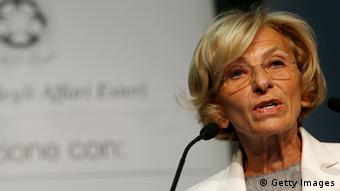For weeks, Italy's political parties have been unable to form a governing coalition. Only a new president can call early elections - and that's what Italy is missing.
If we could agree on a common candidate, we could also agree on a common government - that's what Renato Brunetta said before the presidential election began on Thursday (18.04.2013). The former minister in the cabinet of Silvio Berlusconi thus made clear the electoral expectations the Berlusconi camp: It's not just about the presidency, but also about paving the way for the future government coalition.
For almost two months, Pierluigi Bersani, leader of the largest party in parliament, the social-democratic "Democratic Party" (PD), has tried to persuade the members of the "Five Star Movement" of former comedian Beppe Grillo to form a government together - unsuccessfully. Now he seems to see no other way out of the political stalemate than to approach Berlusconi's "People of Freedom" by seeking to close ranks in the presidential election.
That's because Franco Marini, the man Bersani put forward in the race for the office of president, should more than please Berlusconi, the former prime minister and media tycoon. Marini has been in politics for more than 60 years, a child of the Christian Democratic Party, which disbanded in the 1990s, and a man of the political center. The 80-year-old was already a minister under Giulio Andreotti, but defeated him to become President of the Senate in 2006, and is a master of political balance. His opponents call Marini a virtuoso string-puller. He certainly does not represent the change that many people wish for. The election of the president thus appears to be a game of power and influence that Italian citizens look at with a mixture of fascination and disgust.
Old men, no new ideas
"These gentlemen of 70-plus, in suit and tie, in politics for decades, always the same faces, always the same ideas," sighed Foedora Pasquale, who had tuned the radio in her office to the live coverage from parliament. She would prefer a woman, which would finally be something new, she said.
"Is it harder for a women to become cardinal or president?" prominent Italian women ask in a video from the nonprofit organization "Pari o dispare," which campaigns for equality between women and men. And they are expressing a widespread unease, given the low proportion of women in politics and society.
"Italy could use a woman in the office," drinks supplier Riccardo Bonanno said, and he also has a preferred candidate. Emma Bonino of the "Radical Party," a small party that fought for the right to abortion in the 1970s, and since then has had the personal freedom of the individual at the center of its policies. Bonino has been working internationally for decades for human rights - she was EU Commissioner and minister in the government of Romano Prodi. "Bonino is morally unimpeachable and would, under the circumstances in Italy, be an appropriate and responsible president."
Disappointment with the political caste
Under the circumstances: these are the current government crisis and the broad frustration with politics among the population. "La Casta" is the name given to the politicians' caste in the media and in general usage. The gap between electors and elected is deep, and the wishes of the citizens often get stuck in the spokes of the wheels of the political establishment.
Pierluigi Bersani thus chose not to put forward a female candidate and instead selected a politician who stands for the time-honored logic of political negotiation. Silvio Berlusconi should rejoice, because Marini, who supports a rapprochement between the PD and Berlusconi's PDL, splits the left wing. Nichi Vendola, leader of the SEL, a small but influential left-wing party has called on its members to vote against Marini.
Also, Matteo Renzi, mayor of Florence and internal party rival of Bersani, refuses to vote for Marini. In this way, some votes are migrating to Stefano Rodota, the candidate of the Five Star Movement. Rodota is 79 years old, but as a law professor, he embodies a certain understanding of the institutions. In addition, in his time as an independent left-wing parliamentarian he managed to stay above the infighting. For many PD voters, he is the most suitable candidate for the presidency. In the social networks he is the clear favorite, because he stands for change - at least in part. The displeasure at the political haggling that takes place in Rome can be felt from Milan to Palermo.
Anger over political gamesmanship
"This is a mafia, a clean mafia, the mafia of power," said Mauro Caccia, who runs a snack bar in Genoa. Genoa, the hometown of Beppe Grillo - Caccia has sympathy for him and his political movement. He took part in the online poll initiated by Grillo candidates for election to the office of President.
A woman landed on the top spot. Journalist Milena Gabinelli, known and feared for her investigative television reports about corrupt politicians, misuse of public funds, economic scandals and old-boy networks. Her refusal to run for office made way for Rodota. He was still able to muster 240 out of 1007 votes on the first ballot to Marini's 520. Because no candidate was able to muster the required majority of 672 votes in Thursday's second ballot, the election will continue. Beginning with the fourth ballot, only a simple majority is required, so that Italy will have a new president.




No comments:
Post a Comment